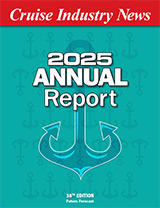
Guidance on the gradual and safe resumption of operations of cruise ships in the European Union in relation to the COVID 19 pandemic has been circulated by the International Maritime Organization (IMO).
To facilitate the gradual and safe restart of cruise ship operations, the European Maritime Safety Agency (EMSA) and the European Centre for Disease Prevention and Control (ECDC) have jointly developed guidance on the gradual and safe resumption of operations of cruise ships in the European Union in relation to the COVID 19 pandemic, which has been circulated by the International Maritime Organization (IMO).
The guidance aims to facilitate a safe re-start of operations of cruise ships in the European Union, by recommending minimum measures expected to be implemented by all concerned, while maintaining general safety and security standards. The guidance is meant for EU/EEA flagged ships engaged in international voyages and for ships calling at an EU/EEA port, irrespective of flag. The IMO said it invites member states and international organizations to utilize the guidance as they see fit and circulate it to all interested parties.
The guidance is roughly divided into three parts. The first addresses the ship side and recommends the development of a COVID-19 company and ship management plan, including a tailor-made risk assessment by each company. The plan should also cover mitigation measures for implementation, as well as the possibility of third party verification.
The second part recommends the development of a COVID-19 port management plan by each member state receiving cruise ships, for which a minimum number of measures are suggested.
The third part recommends elements that the cruise line and ports should agree on before any voyage takes place. It is expected that procedures will be established and in place in case a COVID-19 outbreak happens aboard.
Before starting a voyage, cruise ship operators should ensure that ports along the route, if needed, can make arrangements for passengers and crew to receive medical treatment and repatriation, according to the guidance.
In the event of a possible, probably or confirmed case of COVID-19 is identified onboard, the ship should be diverted to the nearest port where testing can take place and where local health authorities can be consulted to further manage the situation.
Companies should also establish procedures to respond to potential outbreaks and establish drills and exercises for preparing for outbreaks. Response measures would range from definition of roles and duties aboard, communication between the different departments, isolation plan, health and safety management while infected persons are onboard, definition of risk exposure, medical resources, cleaning and disinfection, management of waste, and more.
In terms of physical distancing, the guidance acknowledges that there are spaces aboard where physical distancing is difficult to implement such as the galley, which could instead see tailor-made alternative measures to minimize the risk of transmission. This may also include the temporary closing of spaces if the preventive measures are found to be either not feasible or insufficient.
Not only does the guidance focus on crew and passengers, but also residents in the ports visited during a cruise. Crew and passengers should be informed about the local measures required, and cruise operators should make sure that any excursion provider, tour operator or other external service provider offer at least the same level of protection as aboard the ship in terms of physical distancing, cleaning and disinfection protocols.
The IMO recommends that COVID-19 company and ship management plans are independently verified by a third party. The IMO also points out that the guidance is not intended to replace the verification of specific health measures which may be required by health authorities. And considering the dynamic situation, it is acknowledged that some health advice included in the guidance will likely be updated.




